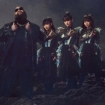Draped in radiant crystals, shimmering black capes and Victorianesque frocks, Su-metal and Moametal are unnaturally still. Under infernal studio lights, they hold delicate kitsune hand-signs parallel to their chest — nails painted bright black, lips neutral in a tight line. It's a moist Monday morning in Brooklyn, at the time of the year when the summer heat slowly relents to the breezy autumnal approach, and the two young women of Babymetal are fresh off a heroic set at New York City's Terminal 5 the previous evening. I watched them traipse through choreography and summon fire and brimstone from the titanic video screen mounted behind them. I heard their tunesome helium voices pierce through the double-bass drums and Castlevania shredding of the backing band. And now, at Revolver's photoshoot, I finally meet the women behind the pomp and circumstance. Su-metal and Moametal might be the ghosts of metal future, but they also remain two young twentysomethings in the belly of the Japanese idol machine — infiltrating the stringent realm of heavy music, one kawaii simper at a time.
To recap: Babymetal are a duo, but they were formed as trio, assembled in Japan in 2010 under the curation of music producer Kobametal. The goal was to create a girl group that fused phantasmagoric, DragonForce-like power metal with the chibi cutesiness of contemporary J-pop. In 2013, this bizarre mashup produced "Gimme Chocolate!!" — which might very well be the most miraculous song ever written. Over a pulverizing deathcore groove, three itty-bitty Japanese girls sang a disarming melody about eating too many sweets. It simultaneously scratched two itches — mosh-pit physical release and elemental pop magic — and 100 million YouTube views later, Babymetal have built a fortress within that paradox. I first heard of them from my father, who was entranced by their appearance on The Late Show With Stephen Colbert. It was a hell of a sight — Babymetal's adult-male instrumentalists appeared as ghosts in white gowns and pallid corpse paint, while the group's three teen vocalists were decked out in leather armor and couldn't look more alive, prancing and chirping upstage. For a dad who rarely listens to anything heavier than Deep Purple, this hit a sweet spot. Babymetal are melodically infectiously and captivatingly weird, and the world is still very much under their spell.
The Babymetal Twitter account charts the many ways Su-metal and Moametal have secreted themselves into heavy music. There are viral snapshots of them with Metallica, with James Hetfield looking as giddy as he ever has. Same with Korn, Anthrax and Rob Zombie, the latter of whom made headlines when he went out of his way to defend Babymetal to a few cantankerous trolls, who felt that their kawaii resonance was a repudiation of some made-up hardcore ethos. ("They are nice kids out on the road touring," Zombie wrote. "What are you doing besides being a grumpy old fuck?") This also has become an ongoing theme: men on the internet making the extremely obvious observation that Babymetal do not make metal in the traditional sense. The girls themselves have never pretended to be anything other than outsiders who are happy to learn the ropes as they go. For two prospects plucked out of Japanese idol cold storage, you couldn't find more ardent disciples.
"In the beginning I thought that metal was something scary, but I learned how thoughtful and amazing metal is," says Su-metal, when I sit down with the duo after the shoot. "I'm so honored to be a part of it."

It's been five years since the shock to the system that was "Gimme Chocolate!!," and three years since the band's sophomore album, Metal Resistance. Metal Galaxy, the band's new, third album, comes at a time when Babymetal have hit some of the first major speedbumps along their astonishing trajectory. Yuimetal, the pigtailed dynamo who gave the group some of its original mystique, parted ways with her compatriots following a mysterious illness, with rumors of her drumming up a solo career in the future. ("It's been difficult, but the bonds between Moametal and I are strong," chirps Su-metal when asked about the lineup shakeup.) More tragically, guitarist Mikio "Ko-Gami" Fujioka fell from an observation deck while stargazing in late 2018 and passed away from the injuries in early January. The band declines to comment on his death.
But as with most things pertaining to Babymetal, you must learn to trust the infrastructure. Metal Galaxy is airtight — packed to the gills with a banquet of comic metal sounds, crafted without any orthodox adherence to form or tradition. On "Shanti, Shanti, Shanti," the girls sing a raga groove over a sprightly, digitized sitar. "Oh! MAJINAI" is a folk-metal mutation that feels like an Eastern Bloc Eurovision deep cut. "Elevator Girl" is built around a carbonated jazz-lite jingle instead of the drop-D in the break. "IN THE NAME OF" is a complete outlier — three minutes of bruising growled vocals and napalm guitar — as if you took a harsh left turn into a Cannibal Corpse purge halfway through the record.
Babymetal tend to take an esoteric approach when talking about the themes of each album, but they've said before that Metal Galaxy focuses on the tension between light and dark, ugly and pretty or, you might imagine, corpse paint and exfoliating cream. "The light side and the dark side are complete opposites, and it illustrates the combination of kawaii, which means cute, and hardcore metal, which are opposites," Su-metal and Moametal jointly explain, this time through a nearby translator who stepped in when the girls couldn't formulate answers in English. "These opposites, when you combine them, create something very fun. The album depicts that."
It's a record about freedom, basically. All the dogma of heavy music drifts away, when you surrender to the excess that Babymetal specialize in. Transmuting extreme metal to girl-group pop defies all logic, and it throws the regimented bona fides and aesthetic thresholds out the window. The songs are pure id; they pop out of the ground with such batshit animus that it makes any detractors look hopelessly foolish. The grognards commenting on Rob Zombie's Facebook aren't even speaking the right language — they still believe Babymetal was incubated in the same primordial soup that birthed the Big 4. It's not. It never was. Babymetal is an institution that machine-learned 40 years of metal and pop and spat out the gloriously delirious results. At the Terminal 5 show I watched them perform over the spiked shoulder of back-patched hesher. There were girls in full cosplay, hypebeast teens in adidas track pants, a legion of bespectacled Pitchfork readers and a decidedly gentle mosh pit in front of the stage. Moametal and Su-metal have liquified everything we thought we knew about music and culture in a blender, and it makes them the perfect band for a supremely fragmented 2019. The first track of Metal Galaxy is called "FUTURE METAL." That's not a warning, it's the truth.

In the middle of our interview, one of Babymetal's handlers reminds me, for the second time, that Moametal and Su-metal only use their stage names in the press. Those handlers also instruct me to shy away from asking about the supposed "dark side" to Metal Galaxy, interject when I want to talk about the band's new dancer, Riho Sayashi, who joined the band at Glastonbury earlier this year, and, a few days before the interview, ask for a written list of the talking points I plan to cover.
These are just a few of the curveballs that make my time actually speaking to the young women of Babymetal a unique, occasionally disconcerting experience. Babymetal arrived flocked by a small army including a bodyguard, makeup and wardrobe personnel and press liaisons, ensconcing Moametal and Su-metal in the huddle of the photoshoot. Both of them are learning English, which they see as only fair, given how their Western fans often sing back to them in Japanese. For the questions I sent over ahead of time, they read their answers back off a sheet of paper in cordial, well-rehearsed English. For my impromptu additions and follow-ups, they respond in short, genial Japanese. For anything that crosses some invisible line, the superintendent quickly swoops in. She also had a copy of the talking points.
These are the moments that force you to remember that while Babymetal has crossed over into America, they remain a Japanese idol group, and Japanese idol groups are primed and packaged in a very rigorous way regardless of the country they're currently in. Very rarely do the management companies who curate idol groups allow a crack of daylight into the personal affairs of their stars. (Some idols even sign contracts forbidding them to date or get married, as that would make them more inaccessible to their fans.) It's a paradigm that puts any journalist in an interesting predicament. I find Su-metal and Moametal to be kind, funny and warm. I find them to have a natural understanding of what makes their music special. And I find that no matter what I ask, or what angle I take, I'm probably not going to learn anything new about them that wasn't in the press release. In that sense, they play their hand perfectly.
All of this, of course, is the prerogative of the Babymetal brain trust. Moametal and Su-metal don't write their own songs, and they're positioned as the vestibule of the Babymetal brand rather than the masters of it. Perhaps the desire to know more about our artists — to poke and prod at their insecurities, their doubts, their hopes and fears — is an appendage of American celebrity worship, and something that might feel exploitative or unnecessary to those outside of it. That's a trend that might be catching on. We live in a time where Beyoncé can hit the cover of Vogue with an essay penned by herself and her team, so maybe Babymetal were ahead of the curve.
But at the end of our interview, there is a moment where I get to peek behind the veil. A split-second where the contrivance drops and I'm hit with what feels like the closest to a genuine reaction that I'm likely to get. I ask the duo about their videos and costumery, which both have taken on a space-age theme for the cosmogonic Metal Galaxy. How did they arrive at that idea? To take Babymetal to the stars?
"[We] had an input in the costumes this time," they reply, through the interpreter. "It reflects that we can overcome any kind of obstacle. It reflects that we can go through anything. We're really enjoying the new thing."
I latch onto that first sentence. It spoke to a shred of agency; proof that, in some small way, the two young women who front the group are cornering off a piece of The Greater Babymetal Expanse for themselves. So I go off-script one last time: Has it been fun having more creative control in Babymetal?
The interpreter repeats my question in Japanese. Moametal says something in her imperceptibly quiet speaking voice, and the rest of the room explodes in laughter. "You can say that in English," says the interpreter.
"I'm so happy," she chimes through a big smile.
It feels like a little bit more of the control over the group will need to be ceded to keep Babymetal happy and healthy. If that can be done, then there's no reason why the group should be going away anytime soon. The Babymetal army is vast and uncompromising, and they've ensured that "Gimme Chocolate!!" won't die as a one-hit wonder. The only thing up in the air is how much authority the two women at the center will have over that legacy.
I ask the duo how Babymetal — which had all the looks of a flash-in-the-pan novelty act — has managed to sustain its success. Su-metal answers with succinct words that resonate: "I think it's because there's no one like us."








